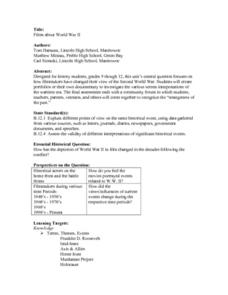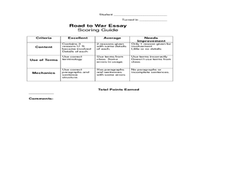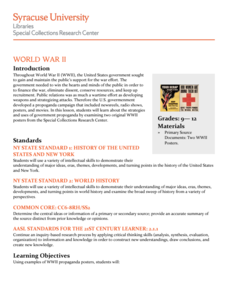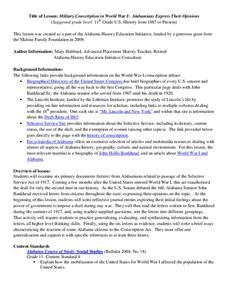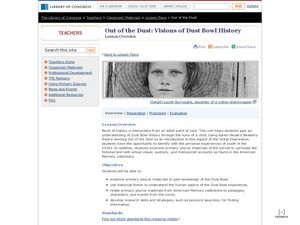Curated OER
The First World War
Students examine the process and effects of World War I on different segments of the population, beyond the political, diplomatic and military framework of the war. They analyze the memoirs of soldiers, read poetry of the time, and...
National History Day
Challenging the Status Quo: Women in the World War I Military
Why are some so resistant to change? The status quo is often to blame for a lack of forward movement in society. Following the events of World War I, women in America suddenly had a voice—and were going to use it. Scholars use the second...
Curated OER
Films About World War II
Ninth graders focus on how filmmakers have changed their view of the Second World War. They create portfolios or their own documentary to investigate the various screen interpretations of the wartime era and explain different points of...
Curated OER
Mexico: Culture, Language, and History
Study the culture, language, and history of Mexico in this collection of lessons. Create maps of Mexico's geography, study Spanish language phrases, and create a fiesta, along with a Mexican Marketplace scene.
Curated OER
East Timor: The World's Newest Country
This isn't just a hand-out or a reading passage; it's more like a mini book on the history, colonization, independence, and culture of the South East Asian country of Timor. There are extensive readings and discussion questions for...
Center for History Education
To What Extent Were Women's Contributions to World War II Industries Valued?
Women rose to the challenge when the nation's war effort called them—but were sent home when the GIs came back from World War II. Young historians consider whether the United States valued women's contributions during the war using a...
Alabama Department of Archives and History
World War II Home Front - Mobilization in Alabama
Ships, tanks, and planes—what does a military need to fight a war? An interesting instructional activity explains the government's military mobilization efforts in Alabama during WWII. Class members look at a PowerPoint presentation and...
Constitutional Rights Foundation
History of Immigration From the 1850s to the Present
The Statue of Liberty may embrace the huddled masses of the world, but has American society always joined in? After young historians read a passage about the history of American immigration in the 19th and 20th centuries, focusing on...
National History Day
Propaganda Posters of World War I: Analyzing the Methods Behind the Images
The power of a picture. During the events surrounding World War I, propaganda posters were widely distributed in American society to sway the emotions of its citizens. By analyzing World War I propaganda posters in the first installment...
National History Day
“Saving the Bear”: The Russian Expeditionary Force of World War One
How have Russian politics affected countries on a global stage? The discussion of the Russian Revolution and World War I begins with an analysis of primary resource letters. Learners finish with a project where they create a timeline of...
Curated OER
World War I
Eleventh graders investigate propaganda used during World War I. In this World War I lesson, 11th graders examine propaganda from the war and analyze war posters. Students then create their own propaganda posters on listed topics.
Curated OER
World War II Laws
Learners explore how laws passed during World War II have helped people with disabilities. In this social studies instructional activity, students research laws passed since World War II and complete a WWII Law chart.
NPR
Partners In Winning The War Lesson Plan
How propaganda was used to change the concept of women's roles during World War II is the focus of an online exhibit provided by the National Women's History Museum. Packed with propaganda posters and pictures, the packet points out how...
Curated OER
Leaders, Laborers, and Other Perspectives of World War II
How did the women in France feel about their country’s involvement in World War II? Class groups are assigned a country involved in WWII, and individuals within the group adopt the point of view of leaders, laborers, businessmen, women,...
National Endowment for the Humanities
James Madison: Raising an Army—Balancing the States and the Federal Government
To war! To war! Every nation in the history of the world has had to deal with warfare on some level. Scholars go through a series of activities and discussions surrounding the development of the Constitution to help them better...
Curated OER
Early U. S. Involvement in World War II
Ninth graders examine how the U. S. was aided by the Allies in World War II before the U. S. declared war. They analyze the evolution of U. S. foreign policy from the beginning of WW II through U. S. Declaration of War
Syracuse University
World War II
During World War II propaganda was as important to the war effort as the soldiers in the field. Scholars consider how the government communicated messages of patriotism with propaganda by examining pieces from World War II. Then, they...
Alabama Department of Archives and History
Military Conscription in World War I: Alabamians Express Their Opinions
If called, would you go? Should the US government have the power to impose a draft during any war? The Selective Service Act of 1917 (aka the Conscription Act of 1917) authorized the drafting of men into the military for only the second...
Curated OER
Government Lesson Plan: Lesson Plan 12
Students investigate various political systems around the world. They complete a chart that compares the U.S. political system with other nations' governments, conduct research on a selected nation, and present an oral report.
Curated OER
The 'Capital' of the World
Students are introduced to the purpose of the World Bank and its president Paul Wolfowitz. After reading an article, they work together to complete a writing exercise in which they use primary source documents to state their viewpoint. ...
Curated OER
Out of the Dust: Visions of Dust Bowl History Lesson Overview
Students complete activities with the book Out of the Dust by Karen Hesse. In this literature lesson, students read this story and view the Dust Bowl history from the eyes of a child. They discover the Great Depression and life in the...
Smithsonian Institution
Racism and Removal: Japanese Incarceration During World War II
During World War II people saw how far the government's control would go, but it was at the expense of its citizens. The resource brings the conditions of Japanese American internment camps to light using primary documents. Scholars...
PBS
Pearl Harbor and the Internment of Japanese Americans during World War II
Balancing national security and civil liberties can be tricky. To appreciate the tension between these two concepts, class members investigate the Japanese attack on the U.S. Naval Base at Pearl Harbor and President Franklin D....
Curated OER
Die Weisse Rose: German History
Students conduct research on a German anti-Nazi group named "Die Weisse Rose", the White Rose, that eventually lost their lives for their resistance to Nazi rule. They view films, access the Internet, prepare responsive narratives to the...




